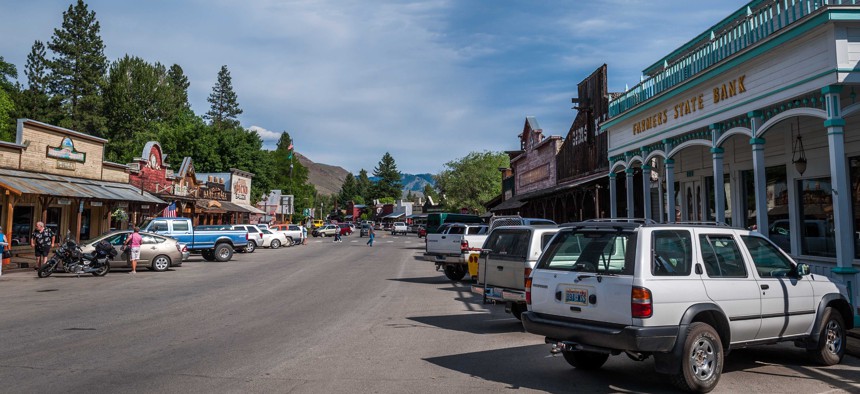Connecting state and local government leaders
Washington’s Methow Valley is a magnet for tourists and people looking to get into the outdoors. But the coronavirus outbreak is stirring mixed reactions about visitors.
Most summers, tourists flock to Winthrop, Washington, a community of fewer than 500 residents with an Old West-themed main drag and abundant opportunities for hiking, biking, and climbing in the mountains and forests outside of town.
But this year the coronavirus is forcing locals into a tough spot—one that was highlighted as visitors crowded into the town over Memorial Day weekend despite state guidelines advising them to stay close to home. “Basically nobody was staying home. I’ll put it that way,” Winthrop’s mayor, Sally Ranzau, said late last week, referring to the scene over the recent holiday weekend.
Patrick Hannigan lives just outside of Winthrop. “It was a circus,” he said of the crowds. “Very few of these people were either wearing masks or practicing social distancing.”
Across Washington, about two dozen counties as of last Thursday had received a green-light from the state to move into the less restrictive “Phase 2” of a reopening plan guiding the transition away from the state's stay-at-home order. The plan aims to gradually relax restrictions on residents and businesses as virus risks subside. But even in this phase, people are advised to limit “non-essential” travel.
In a press conference on Friday, Inslee cautioned people against traveling to popular tourist towns. “For the moment, not going to these centers right now and overwhelming these communities, they really appreciate it,” he said. “Let’s try to stay home as much as we can.”
Despite recommendations like this, tourist traffic will likely continue to flow into towns like Winthrop as the state eases virus-related restrictions and people who’ve been cooped up venture out, seeking to take advantage of long days and beautiful summer weather.
It’s a set of circumstances many rural tourist destinations are apt to face in the months ahead.
“I’m not sure it matters what we do, the floodgates are open,” said Hannigan. “People have spoken through their actions and there's a large number of people who've just decided that they're done with this. The pandemic is over in their minds, or it never started.”
Many local business owners are of course hungry for the money tourists typically spend. But some people in Winthrop and the surrounding Methow River valley aren’t all together comfortable with an influx of outsiders, especially when some visitors appear to ignore guidelines calling for people to keep distance from others or when they choose to not wear face masks.
Winthrop has few nearby medical facilities, one police marshal and one deputy and only one ambulance service for the entire valley, Mayor Ranzau explained. She also noted that businesses residents depend on, like grocery stores, rely on a small base of workers.
The Methow Valley, as of last week, had just five confirmed cases of the coronavirus since mid-April, according to the mayor. But if the sickness were to spread widely in the area, it’s easy to see how it could put a serious strain on limited resources.
“Our economy is tourism, period,” Ranzau said. But she added: “The workings of the town, right now, are not up to speed to handle the tourists that we normally have.”
Beyond that are the risks faced by any destination city or town in the age of a pandemic. Locals face health risks brought on by visitors who may have the highly contagious virus without knowing it or showing any obvious symptoms.
“There’s a lot of people here who feel pretty vulnerable,” said Hannigan, who earlier on in the outbreak briefly launched an online petition to “Close the Methow” to outsiders.
Hannigan is a small business person—he crafts high-end nest boxes for birds, bats and bees out of salvaged wood—and relies on out-of-town customers to make a living. He worries, though, that if tourism ramps up again too fast, or if visitors flout precautions, it could undermine progress the state has made to control the virus, causing future restrictions and an even harder economic blow.
“We are dependent on and subject to other people’s choices,” he said.
Winthrop is about a four hour drive from Seattle via Highway 20. Traveling from the west, the road carves a dramatic path up into the North Cascades mountains, reaching a crest at 5,400 feet above sea level at Washington Pass, before dropping down into the Methow valley and eventually winding its way through the center of Winthrop.
The pass closes each year in the snowy winter months when it becomes avalanche prone, meaning that visitors from the Puget Sound region around Seattle need to take a longer alternative route to reach the valley. Despite the lengthier drive, the Methow is still a popular destination for cross country ski enthusiasts and other winter visitors.
But summer is an especially important time for area businesses like hotels and cabin rentals, brew pubs, restaurants and shops selling goods like books, artwork and outdoor gear.
“I think most businesses are probably pretty excited to see tourists back,” said Marc LeDuc, general manager at the Mazama Store, a popular general store and eatery located in the tiny town of Mazama, an outdoor recreation hub in between Winthrop and Washington Pass.
“We do rely on the summer to make money around here,” LeDuc added.

To cut down on virus risks, the store has been requiring face masks or comparable coverings for both staff and customers who come inside to shop. If someone wants to order a sandwich, an espresso or baked goods, they can do that from outside, LeDuc explained.
“We’ve put a lot of emphasis on employee safety and customer safety,” he said.
“I’ve had people come in and be like, ‘oh man, you guys require masks, I’m going to go somewhere else,’” LeDuc added. “Which is fine for us…it’s a free country.”
Back down the road in Winthrop, Carolyn Westerfield became a new owner of the Rocking Horse Bakery in January, only a couple of months before the virus led to sweeping business closures and an economic crash in Washington and around the country.
The bakery, like other eateries, has been getting by relying on take-out customers only. Westerfield said there are chairs inside marking six-feet of distance for customers who come in to order, which allows for no more than about four customers to be inside at any one time.
She said her workers wear masks—which the state will require beginning on June 8 for most employees at businesses where workers interact with one another or customers. The bakery doesn’t require customers to don face coverings, but a sign on the door asks them to.
“This is the first big challenge we’ve had. If we close the doors, there’s a chance that we won’t get through it. We have to have some cash flow. I feel that it’s possible to serve customers and also follow the rules and be safe,” Westerfield said.
But she also acknowledged that within the community there are mixed feelings—which at times crop up in strongly worded social media posts—about visitors coming to the valley and how businesses are handling it. She said she understands each side of the debate.
“The businesses are doing the best they can,” Westerfield said. “We want to serve the community, we don’t want to go out of business. We want to survive this.”
“There’s an economic issue and there’s a safety issue,” she added.
Bill Lucia is a Senior Reporter for Route Fifty and is based in Olympia, Washington.

NEXT STORY: Feds to Investigate Shooting of Black Business Owner in Louisville




